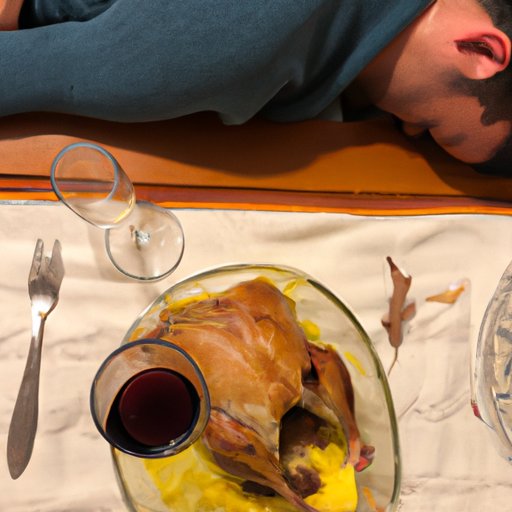
Why Does Turkey Make You Tired? Exploring the Science and Tradition Behind Thanksgiving’s Most Iconic Dish
Thanksgiving is a time for family, friends, and, of course, food. And while the star of the show is undoubtedly the turkey, it’s often blamed for the post-meal lethargy that people experience. But is turkey really to blame for the infamous “food coma,” or is there more at play? In this article, we’ll explore the science and cultural significance of turkey in Thanksgiving meals, addressing both the biological and psychological factors that contribute to feelings of tiredness. We’ll also offer practical tips for avoiding that post-meal slump, ensuring that you can enjoy your holiday to the fullest.
The Science Behind Turkey: Why Does it Make You Tired?
First, it’s important to understand the role that tryptophan plays in the body. Tryptophan is an essential amino acid that the body can’t produce on its own but needs to function properly. When we consume foods like turkey that are high in tryptophan, our bodies break it down into neurotransmitters like serotonin, which can contribute to feelings of drowsiness and relaxation.
However, it’s worth noting that while turkey does contain tryptophan, it’s not the only food that does. In fact, many other types of meat, dairy products, and nuts all contain similar levels of tryptophan. So, while turkey may play a role in making you feel tired, it’s not the sole culprit.
That being said, there is scientific evidence to support the idea that consuming turkey can contribute to feelings of fatigue. In a study published in the journal Nutritional Neuroscience, researchers found that participants who consumed tryptophan-rich foods like turkey had higher levels of serotonin and melatonin, which are both associated with sleepiness. However, it’s important to note that this was a small study, and more research is needed to fully understand the effects of tryptophan consumption on the body.
Overeating at Thanksgiving: Is Turkey to Blame for Your Food Coma?
While tryptophan may play a role in making you feel tired, it’s important to remember that there are other factors at play during a Thanksgiving meal that can contribute to feelings of fatigue. One of the biggest factors is overeating. When we consume large portions of food, our bodies divert blood flow to the digestive system to aid in the absorption and processing of nutrients. This shift can contribute to a lack of energy, as less blood is flowing to the brain and other organs.
In addition to turkey, many other foods commonly eaten at Thanksgiving meals can contribute to feelings of tiredness. For example, dishes like mashed potatoes, stuffing, and gravy are all high in carbohydrates, which can cause blood sugar levels to spike and then crash, leading to feelings of fatigue.
That being said, it’s worth debunking the myth that turkey alone is solely responsible for post-Thanksgiving sleepiness. As we’ve seen, portion size and other dishes all play a role in how we feel after a big meal.
How to Avoid Feeling Tired After Eating Turkey: Practical Tips for a More Energetic Thanksgiving
If you’re looking to enjoy your Thanksgiving meal without feeling overly tired, there are a few practical tips you can follow. For starters, try pacing yourself throughout the day. Start with a light breakfast to keep your appetite in check and take breaks between courses to allow your body time to digest.
Staying active is also important. Whether you go for a walk or play a game of touch football, getting some exercise can help boost energy levels and aid digestion. Additionally, staying hydrated and avoiding excessive alcohol consumption can help mitigate the effects of overeating.
The Cultural Significance of Turkey in Thanksgiving Meals: Exploring the Origins of a Tradition
While the scientific explanations surrounding turkey and tryptophan are important to consider, it’s also worth exploring the cultural significance of turkey in Thanksgiving meals. Turkey has been a part of Thanksgiving celebrations since the colonial era, with early feasts featuring a range of wild game and fish. Over time, turkey became associated with the holiday more broadly, and it remains a symbol of abundance and American heritage to this day.
In addition to its symbolic significance, turkey is also often associated with feelings of relaxation and contentment. The act of eating a big meal with loved ones can be emotionally comforting, and turkey’s role as a centerpiece of the meal makes it a focal point for these feelings.
Myths and Misconceptions About Turkey and Thanksgiving: Separating Fact from Fiction
Finally, it’s worth debunking some common myths and misconceptions about turkey and Thanksgiving. One of the most persistent myths is that turkey contains more tryptophan than other meats. In reality, while turkey does contain tryptophan, it doesn’t contain any more than other types of meat. Additionally, while turkey may be a healthy source of protein, it doesn’t have any medicinal properties that can cure insomnia or other sleep-related disorders.
However, the power of suggestion is strong, and believing in the myth of turkey-induced drowsiness can influence how we experience the effects of the meal. By separating fact from fiction, we can better understand the role that turkey plays in Thanksgiving meals and how we can enjoy our food without falling asleep at the table.
Conclusion
While it’s true that turkey contains tryptophan, its role in making us feel tired after a big meal may be overstated. The real culprit behind post-Thanksgiving lethargy is likely a combination of overeating and other factors like carbohydrate-heavy dishes and alcohol consumption. However, turkey is also an important symbol of American bounty and a source of emotional comfort during a time of gathering and celebration. By following some practical tips and separating fact from fiction, we can enjoy our Thanksgiving meals without feeling overly tired or rundown.





